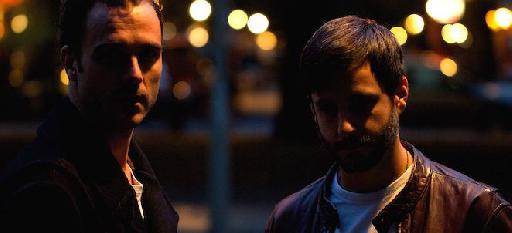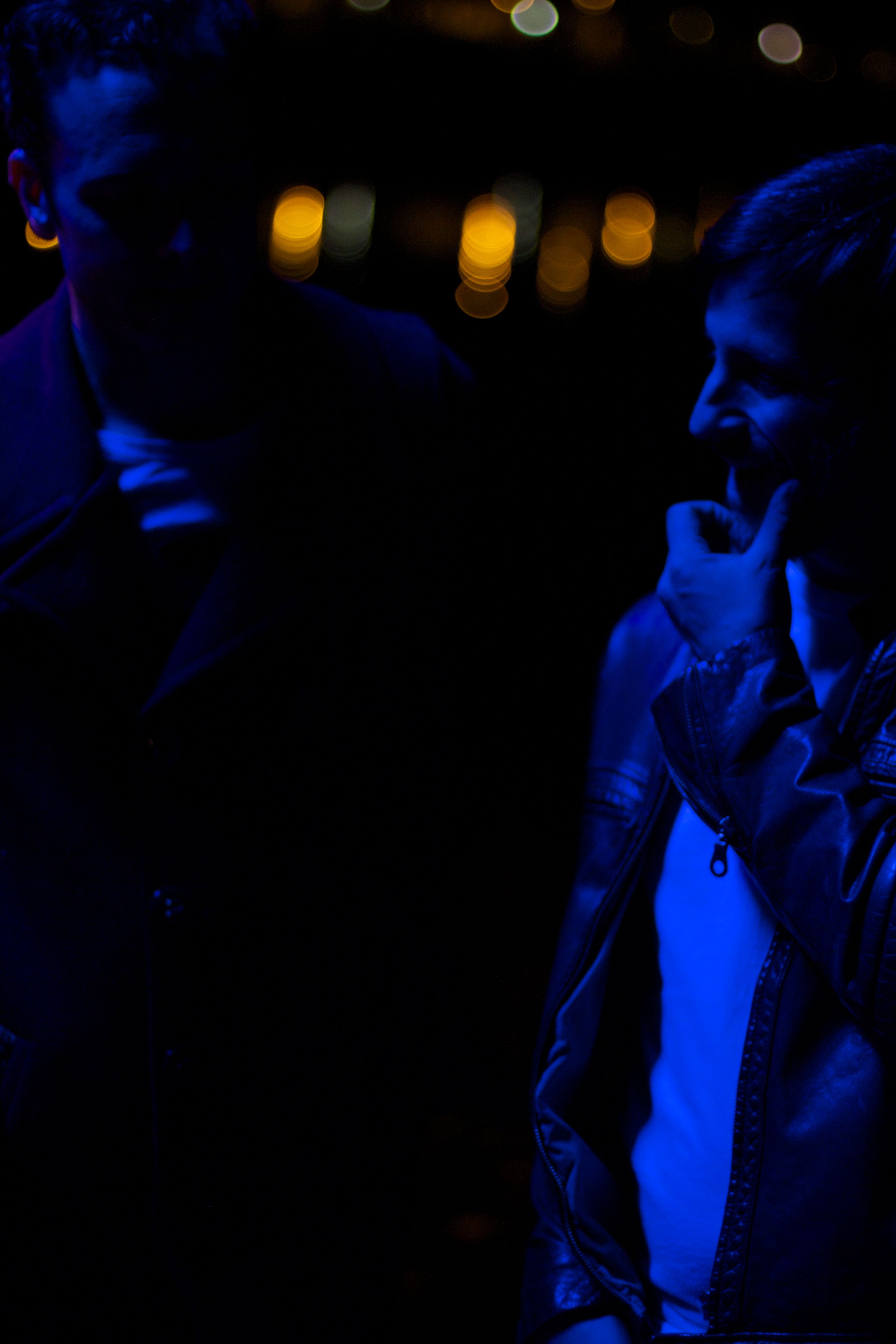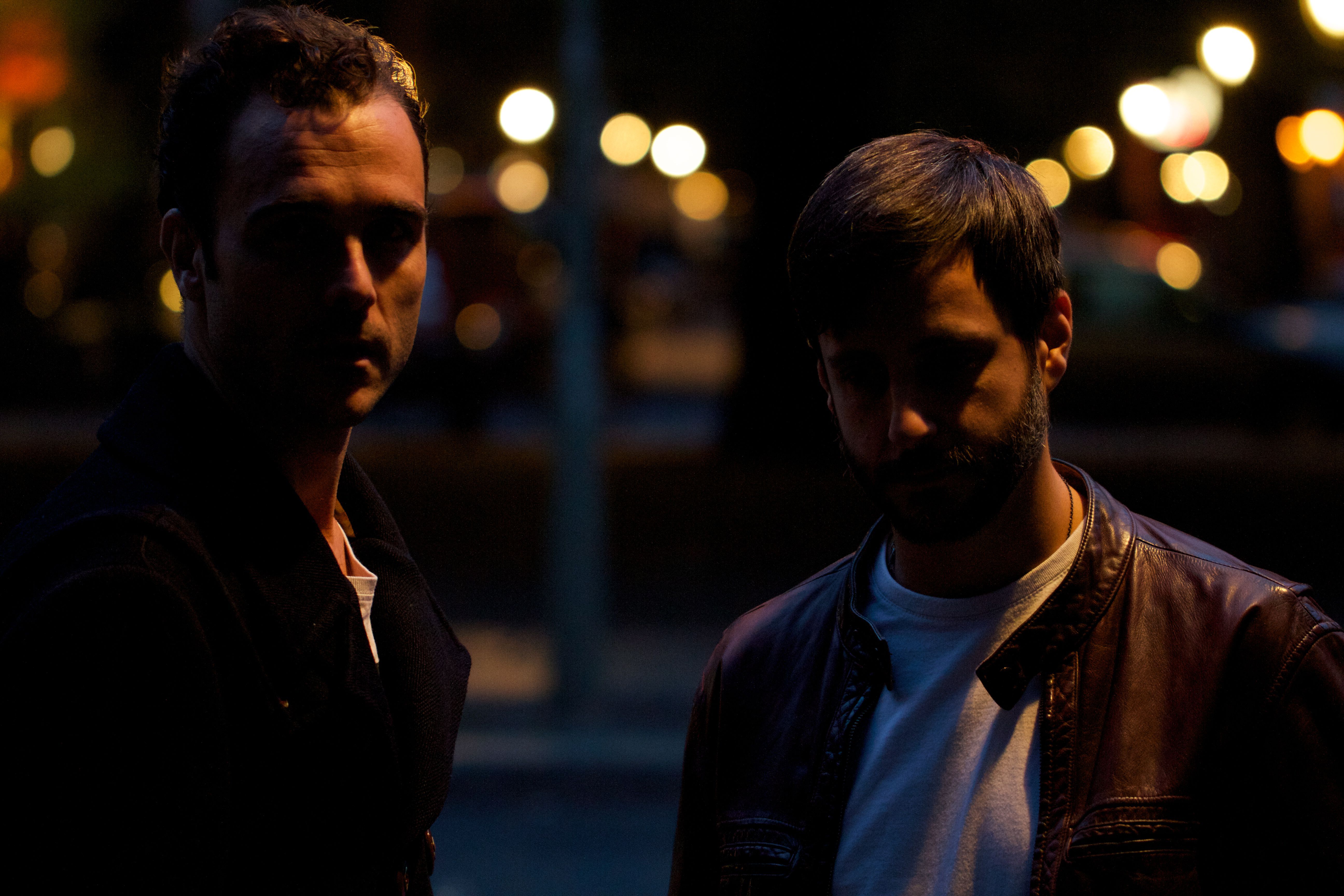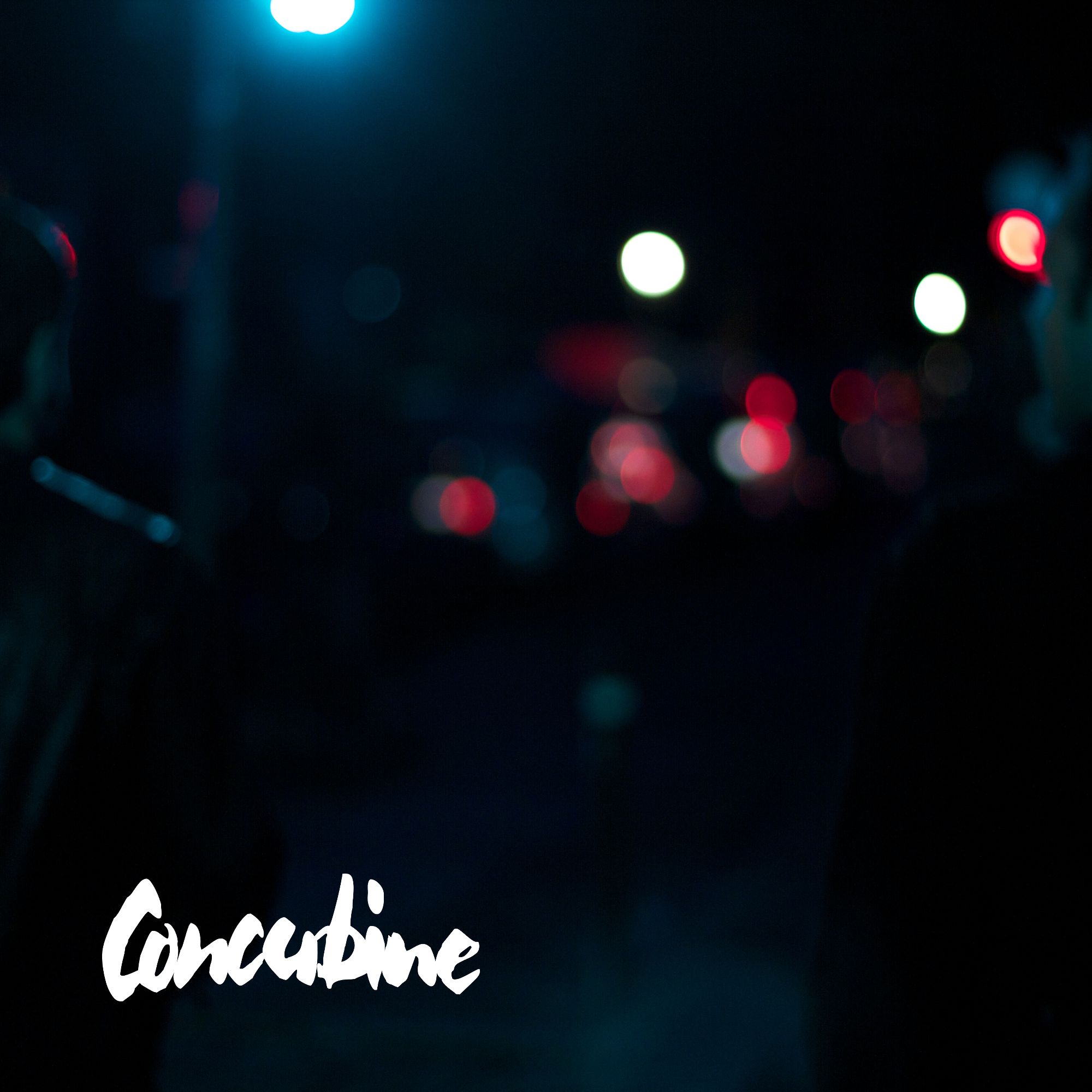Rick and Noah may hail from opposite corners of the pacific, but in Berlin they found common footing in the late-night, all-day, anything-goes parties that make the city infamously alluring to wayward youth around the globe. The city is also a notorious hotbed of creativity and studios teeming with gear.
Soon after moving into the same neighborhood, they began collaborating weekly, turning out a mutant techno sound as indebted to Miami bass and Italo-disco as it is to Sun Ra's futuristic free jazz visions or Lee “Scratch” Perry's Ark-burning dub. Adopting the Concubine moniker, their debut album is available now via their website: http://www.concubine.cc
We locked them in a room with an array of caffeinated beverages and a voice recording app, and invited them to interrogate each other about their influences, techniques, and how they got where they are today.
Noah: When interviewers ask about influences, they typically refer to musical influences—can you speak to some of the non-musical influences on your work?
Rick: Music has primarily been a way to connect with my body—to learn to “forget myself” and become a little more present. Oddly enough, music is a way to find a sort of “inner silence.” In this sense, meditation, yoga, and exercise are foundational for me—variations on a musical theme. Music is also fundamentally about community, fostering trust and celebration. It's the language of belonging and examining what it means to be human.
Without a reminder that we're writing for each other—for something “bigger”—and that we “hear” via each other, music just becomes sterile and dull to me. It's a healing art, I think. Or at least, at its best it can be—and this is extremely motivating. I'm obsessed with history, written and spoken language, and voices of resistance and revolution. All of these inform my music. And the conversation continues.
Growing up in sleepy Western Canada, can you explain the context of your first encounters with electronic sounds, and how and why you were drawn in by them? Which particular pieces of gear do you remember feeling an immediate affinity for, and do you recall how you encountered them? For you, what's the root of the enduring appeal of synthesized sound?
"When I first heard a 303 it was a revelation—I didn't know what the hell it was, but it sounded like a cyborg porno."
Noah: My first genuine encounters with electronic music were at underground rave parties in Victoria and Vancouver. It was mostly local guys like Tyler Stadius, Rennie Foster, Jay Tripwire, Tyger Dhula, and The Mole back then, although people like Derrick May, Doc Martin, Armand Van Helden, and Stacey Pullen all passed through within that first year of staying out all night every weekend. Playing bass and guitar and making four-track demos throughout my teenage years, I was instantly enchanted by the hypnotic structures, futuristic sounds, and syncopated rhythms—along with the notion that I could probably realize my own compositions fairly quickly and independently using these tools.
When I first heard a 303 it was a revelation—I didn't know what the hell it was, but it sounded like a cyborg porno. That, and the old Korg M1 house organ so common in mid-90s production were two iconic tones that got me hooked. So I started making weird loopy demos and jamming with friends using a Roland TR-505 that my brother handed down and an old Realistic-branded Minimoog I had picked up on the cheap—and never looked back.
So I'm curious, what was the first sequencer you learned? Did the style of that sequencer influence your approach to programming in some way? How has your process evolved over the years?
Rick: Funny you mention the Roland 505, since my first “sequencer” was actually a TR-505 drum machine which I realized could transmit MIDI notes corresponding with drum pads being triggered. I remember using the preset drum patterns in the unit to sequence random notes on my first synth, a Roland JX-3P.
Wide-eyed, in awe, this randomized approach to sequencing was my first and most enduring. It taught me there could be beauty, randomness and unexpected language generated from apparent chaos. It's a lesson which was immediate, palpable, and surprising—and has definitely stuck with me. There's a hidden language in everything. Often just allowing machines to generate their own ideas can be extremely liberating.
"I've never forgotten the lesson of just letting the machines say whatever it is they feel like saying."
My process is more structured these days, but I've never forgotten the lesson of just letting the machines say whatever it is they feel like saying. Improvisation is my life blood, regardless of tools. I like to keep things random, yet simple. Your approach to studio production these days seems rather streamlined and elegant—centered around Live and Push. Has this DAW-specific approach taught you anything in particular that new producers awash in options might benefit from?
Noah: Push with Live is such a great hub to work with external equipment and sketch out ideas without having to stare at the screen during that crucial creative burst of the initial production stage. For me it's just a rig I'm comfortable with and it's not something I would ever insist others adopt blindly. The key is to learn to use whatever controllers and gear you have on hand like an instrument—to be able to harness their functions intuitively without having to pause and think through how to do things.
"As a past MPC user I love real-time note entry, getting that human feel of playing things in un-quantized."
Personally, I've always loved step-sequencing—I often see rhythms in the grid almost simultaneously to feeling or hearing them. But as a past MPC user, I also love real-time note entry, getting that human feel of playing things in un-quantized, and taking advantage of velocity sensitivity—particularly with note repeat switched on. Having those two drum programming modes merged into the same interface at the same time is one of the essential features of Push for me.
The scaled note entry stuff is great too—giving me access to what feels like a different set of harmonic relationships than a keyboard or fretboard might reveal. You're an accomplished guitarist and musician as well. How has this impacted your work as a techno artist? What advantages and disadvantages has it presented?
Rick: Having a solid grasp of harmony, melody, dynamics, and arrangement conventions has definitely been a gift over the years. For the untrained—particularly those exploring more conventional pop or rock modalities—it's really difficult to progress without a bedrock of canonical knowledge, terminology, and awareness of “standard practice.” For this I'm extremely thankful.
"I always loved the way that techno and electronic music gave a big middle finger to the musical establishment's notions of what defines “real” music."
On the flip side, I always loved the way that techno and electronic music gave a big middle finger to the musical establishment's notions of what defines “real” music. I still feel like I need to forget the way my training suggests something “should” sound, and relearn to hear through the ears of the untrained. As a musician, I don't want to make music for other musicians. I want to make music for people to dance to, make love to, to dream to—without the burden of over-intellectualization.
Being classically trained has often kept me in my head at the expense of visceral experience, which I'd like to unlearn. You've taught a great deal recently about randomized process in music, exploiting MIDI tools to generate chaotic material. In a world obsessed with control, this could be construed as a “dangerous” idea. What's the appeal to you of randomness, chaos, and surrender?
Noah: Well, pure chaos isn't going to result in anything musically usable. So what I tend to explore is more of a cultivated chaos. There's plenty of creativity in determining the parameters of randomized input, and where that randomization gets channeled, pruned, edited, and eventually manifests itself in a composition.
In my view, everything we do in the studio is imbued with some hint of chaos. I think we can only take responsibility for our creations up to a point. I mean, untold hours, decades, centuries, even millennia of human thought, practice, trial and error had to play out before you or I could comfortably sit down at a laptop and bang out a techno track. It's all too easy to lose sight of this.
"In my view, everything we do in the studio is imbued with some hint of chaos."
In my own practice, I rarely resort to these sort of generative techniques, but I'm consistently astonished at how fertile they can be. In the ongoing quest to lose myself in the studio, inviting these stochastic systems into the process feels like an invocation of sorts—an attempt weave something far bigger into the proceedings. Would you say you have any similar techniques? How do you remain productive and focused in the studio while avoiding formula and routine? What are your strategies to keep things fresh? How do you avoid fatigue?
Rick: I generally have three or four different projects running concurrently—each requiring different workflows and approaches. Sample production and sound design work often involve a lot of messing-around and “playtime”, whereas composition is more structured and linear. These things counterpoint each other nicely.
When I'm feeling fatigued, I generally lock down into more process work—trimming samples, processing files, arranging folders. Vital to my creative process is working in a range of environments—trains, cafes, bars, airports, studios, on the sofa, in bed, late at night, at sunrise. There is no single “right” way I find to working well, aside from regular dedicated practice, and willingness to radically hijack my own process from time to time. Wine also helps. As does silence. Daily exercise is also vital. And it's been a lot of fun to collaborate. What lessons have the collaborative writing process taught you the most?
The Concubine album is free to download. Link at bottom of article.
Noah: The glimpse into someone else's studio process that collaboration affords is incredibly insightful. There are myriad ways to achieve musical goals, and I agree—I don't think any particular way is more “right” than another. A lot of it is about listening in a different way, and recognizing the enhanced potential that exists when two or more perspectives—and lifetimes of creative experience—are brought to bare in the studio.
The ability to hear things in a new light is a gift in itself, and the giddiness of shared enthusiasm about an emerging composition has a very different quality than jamming alone, which can sometimes feel a bit self-indulgent. In either case, I find instinct plays a big role for me. What's the role of instinct for you in the studio? Do your ideas take shape intellectually, or is it a more intuitive process?
Rick: I'm constantly wrestling between working with hardwired dance music conventions and the personal need to subvert them. Spending so much time working on DJ music has the disadvantage of overlaying a fairly insistent set of mix “rules”. With this in mind, my actual composition process feels very natural, organic, and uncontrived. The challenge is to keep things light and playful, and not become totally bound by form or “productivity.”
"I'm constantly wrestling between working with hardwired dance music conventions and the personal need to subvert them."
It's helpful to be reminded that occasionally the rulebook should be rewritten entirely—or at least thrown out the window with vigour. Deleting vast swaths of work can also prove liberating, and occasionally, major hard drive crashes offer the gift of a blank slate. Happy accidents and the like.
Accidents or not, it seems like the legacy of innovation in electronic music is going through some kind of shift. Legendary labels like Warp once carried the banner of genre-busting sound design innovation; now it feels as though, ironically, these sonic accolades are championed just as strongly by R&B and pop's super producers. Have we reached “peak” innovation? Where are you drawing fresh inspiration from? Who and why?
Noah: “Peak innovation” ought to be an outlandish concept so long as the imagination is still in play. That said, I can attest to a lack of discernible imagination in a lot of music available today, but there's probably tons of bedroom producers out there innovating in all kinds of ways we'll never hear. Maybe we just have to listen harder and do more research.
Personally, I draw inspiration for innovation in my own work from the avalanche of new technology being brought to market nearly every day—it's really an incredible time to be making this kind of music. I also look to art, literature, architecture, cinema, urban landscapes and the natural world for patterns, contrasts, narratives, relationships, and systems that can inform my creative process.
Download the Concubine album now at: http://www.concubine.cc
Learn electronic artist tips from Noah & Rick here.
Check out Concubine's Uncorp on Splice.com (awesome online project collaboration and syncing service) here: https://splice.com/AskAudio/concubine-uncorp






 © 2024 Ask.Audio
A NonLinear Educating Company
© 2024 Ask.Audio
A NonLinear Educating Company
Discussion
Want to join the discussion?
Create an account or login to get started!